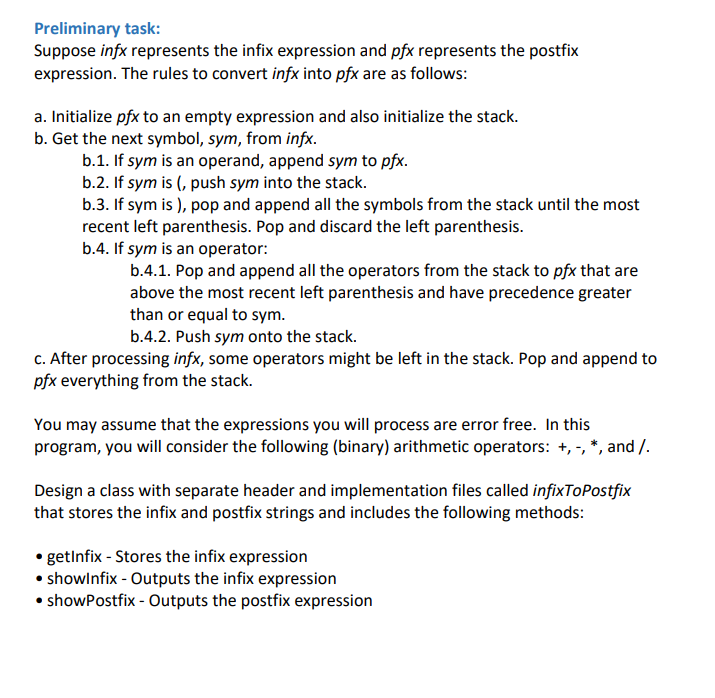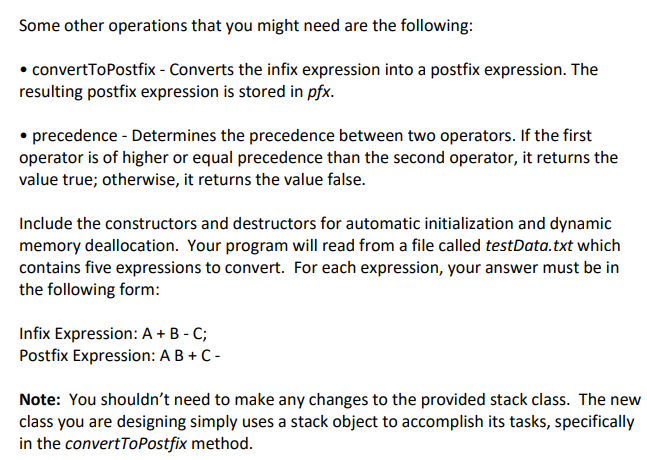Question
in C++ ----testData------ A+B-C; (A+B)*C; (A+B)*(C-D); A+((B+C)*(E-F)-G)/(H-I); A+B*(C+D)-E/F*G+H; ---stackADT---- //Header file: stackADT.h #ifndef H_StackADT #define H_StackADT template class stackADT { public: virtual void initializeStack() =
in C++


----testData------
A+B-C; (A+B)*C; (A+B)*(C-D); A+((B+C)*(E-F)-G)/(H-I); A+B*(C+D)-E/F*G+H;
---stackADT----
//Header file: stackADT.h
#ifndef H_StackADT #define H_StackADT
template
virtual bool isEmptyStack() const = 0; //Function to determine whether the stack is empty. //Postcondition: Returns true if the stack is empty, // otherwise returns false.
virtual bool isFullStack() const = 0; //Function to determine whether the stack is full. //Postcondition: Returns true if the stack is full, // otherwise returns false.
virtual void push(const Type& newItem) = 0; //Function to add newItem to the stack. //Precondition: The stack exists and is not full. //Postcondition: The stack is changed and newItem is added // to the top of the stack.
virtual Type top() const = 0; //Function to return the top element of the stack. //Precondition: The stack exists and is not empty. //Postcondition: If the stack is empty, the program // terminates; otherwise, the top element of the stack // is returned.
virtual void pop() = 0; //Function to remove the top element of the stack. //Precondition: The stack exists and is not empty. //Postcondition: The stack is changed and the top element // is removed from the stack. }; #endif
----myStack----
//Header file: myStack.h
#ifndef H_StackType
#define H_StackType
#include
#include
#include "stackADT.h"
using namespace std;
template
class stackType: public stackADT
{
public:
const stackType
//Overload the assignment operator.
void initializeStack();
//Function to initialize the stack to an empty state.
//Postcondition: stackTop = 0;
bool isEmptyStack() const;
//Function to determine whether the stack is empty.
//Postcondition: Returns true if the stack is empty,
// otherwise returns false.
bool isFullStack() const;
//Function to determine whether the stack is full.
//Postcondition: Returns true if the stack is full,
// otherwise returns false.
void push(const Type& newItem);
//Function to add newItem to the stack.
//Precondition: The stack exists and is not full.
//Postcondition: The stack is changed and newItem is
// added to the top of the stack.
Type top() const;
//Function to return the top element of the stack.
//Precondition: The stack exists and is not empty.
//Postcondition: If the stack is empty, the program
// terminates; otherwise, the top element of the stack
// is returned.
void pop();
//Function to remove the top element of the stack.
//Precondition: The stack exists and is not empty.
//Postcondition: The stack is changed and the top element is
// removed from the stack.
stackType(int stackSize = 100);
//Constructor
//Create an array of the size stackSize to hold
//the stack elements. The default stack size is 100.
//Postcondition: The variable list contains the base address
// of the array, stackTop = 0, and maxStackSize = stackSize
stackType(const stackType
//Copy constructor
~stackType();
//Destructor
//Remove all the elements from the stack.
//Postcondition: The array (list) holding the stack
// elements is deleted.
private:
int maxStackSize; //variable to store the maximum stack size
int stackTop; //variable to point to the top of the stack
Type *list; //pointer to the array that holds the stack elements
void copyStack(const stackType
//Function to make a copy of otherStack.
//Postcondition: A copy of otherStack is created and assigned
// to this stack.
};
template
void stackType
{
stackTop = 0;
}//end initializeStack
template
bool stackType
{
return(stackTop == 0);
}//end isEmptyStack
template
bool stackType
{
return(stackTop == maxStackSize);
} //end isFullStack
template
void stackType
{
if (!isFullStack())
{
list[stackTop] = newItem; //add newItem to the
//top of the stack
stackTop++; //increment stackTop
}
else
cout
}//end push
template
Type stackType
{
assert(stackTop != 0); //if stack is empty,
//terminate the program
return list[stackTop - 1]; //return the element of the
//stack indicated by
//stackTop - 1
}//end top
template
void stackType
{
if (!isEmptyStack())
stackTop--; //decrement stackTop
else
cout
}//end pop
template
stackType
{
if (stackSize
{
cout
cout
maxStackSize = 100;
}
else
maxStackSize = stackSize; //set the stack size to
//the value specified by
//the parameter stackSize
stackTop = 0; //set stackTop to 0
list = new Type[maxStackSize]; //create the array to
//hold the stack elements
}//end constructor
template
stackType
{
delete [] list; //deallocate the memory occupied
//by the array
}//end destructor
template
void stackType
{
delete [] list;
maxStackSize = otherStack.maxStackSize;
stackTop = otherStack.stackTop;
list = new Type[maxStackSize];
//copy otherStack into this stack
for (int j = 0; j
list[j] = otherStack.list[j];
} //end copyStack
template
stackType
{
list = NULL;
copyStack(otherStack);
}//end copy constructor
template
const stackType
(const stackType
{
if (this != &otherStack) //avoid self-copy
copyStack(otherStack);
return *this;
} //end operator=
#endif
Preliminary task: Suppose infx represents the infix expression and pfx represents the postfix expression. The rules to convert infx into pfx are as follows: a. Initialize pfx to an empty expression and also initialize the stack. b. Get the next symbol, sym, from infx. b.1. If sym is an operand, append sym tpx b.2. If sym is (, push sym into the stack. b.3. If sym is), pop and append all the symbols from the stack until the most recent left parenthesis. Pop and discard the left parenthesis b.4. If sym is an operator: b.4.1. Pop and append all the operators from the stack to pfx that are above the most recent left parenthesis and have precedence greater than or equal to sym. b.4.2. Push sym onto the stack. c. After processing infx, some operators might be left in the stack. Pop and append to pfx everything from the stack. You may assume that the expressions you will process are error free. In this program, you will consider the following (binary) arithmetic operators: +, -, *, and/ Design a class with separate header and implementation files called infixToPostfix that stores the infix and postfix strings and includes the following methods: getlnfix - Stores the infix expression showlnfix-Outputs the infix expression showPostfix- Outputs the postfix expression
Step by Step Solution
There are 3 Steps involved in it
Step: 1

Get Instant Access to Expert-Tailored Solutions
See step-by-step solutions with expert insights and AI powered tools for academic success
Step: 2

Step: 3

Ace Your Homework with AI
Get the answers you need in no time with our AI-driven, step-by-step assistance
Get Started


